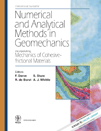Application of extended Kalman filter to back analysis of the natural stress state accounting for measuring uncertainties
Abstract
In this work, we present a numerical procedure for determining the nature stress state in the rock mass around a tunnel. A finite element method is applied for analyzing the direct problems of tunneling during the back analysis of parameter estimation, in which a no-tension elastic–plastic model is used to simulate the elastic–tensile and elastic–plastic-tensile failure states which often occur in the cases of underground excavation in heavily jointed rock masses. By considering the natural stress state as random parameters of the tunneling system, the Kalman filter method is employed for feedback analysis to modify the parameter values in a statistical context, which uses the prior information in the process of estimation and employs a set of displacements obtained from field measurements. To verify the effectiveness of the proposed method of inverse analysis, the developed numerical procedure is applied to a synthetic example of deep tunnels in yielding rock masses. The relative importance of the a priori and updating information is investigated, as is the importance of their uncertainty. The results show great potential of the proposed approach. Copyright © 2010 John Wiley & Sons, Ltd.




